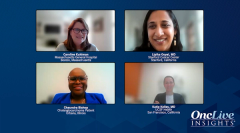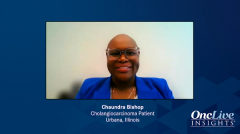
Risk Factors Leading to Various Liver Cancers
The intricate web of risk factors influencing diverse forms of liver cancers are explored.
Episodes in this series

This page is funded by Taiho Oncology, Inc. The faculty and publisher are solely responsible for this content. Taiho does not recommend or endorse the use of its products other than as described in the approved labeling. The content of this page is not medical advice and does not replace independent medical judgment.
This is a video synopsis/summary of a OncLive Insights involving Lipika Goyal, MD; Chaundra Bishop; R. Katie Kelley, MD; and Caroline Kuhlman, NP.
According to Dr Kelley, when considering liver cancer, it is important to understand the causes, including intrahepatic cholangiocarcinoma and primary hepatocellular carcinoma within the liver, which can result from inflammatory or injurious conditions like hepatitis, alcohol overuse, toxins, infections, or metabolic-associated fatty liver disease related to Western diets. It’s noted that while patients with liver injury from hepatitis B, fibrosis, or cirrhosis undergo screening for hepatocellular carcinoma (HCC) and intrahepatic cholangiocarcinoma may sometimes incidentally be detected, there is currently no good screening test specific for extrahepatic cholangiocarcinoma. However, in families with genetic cancer syndromes conferring higher cholangiocarcinoma risk, considering how to screen high-risk members is worthwhile. Dr Goyal adds that patients with primary sclerosing cholangitis or inflammatory bowel disease occasionally get cross-sectional abdominal imaging to try detecting biliary tract cancer early, but the tendency for cholangiocarcinoma to spread along bile ducts makes it challenging to distinguish from inflammatory conditions.
While cholangiocarcinoma is uncommon relative to other cancers (about 8,000-10,000 annual cases in the U.S. compared to 50,000 pancreatic, 150,000 colorectal and 220,000 lung cancers), the incidence of intrahepatic cholangiocarcinoma is rising. Dr Goyal characterizes cholangiocarcinoma as an insidious cancer spreading through the biliary system that can be difficult to detect distinct from inflammatory biliary conditions like primary sclerosing cholangitis on standard screening tests. More research is needed to develop evidence-based guidelines around screening extrahepatic cholangiocarcinoma in patient subgroups at elevated risk, though consideration of how to screen high-risk members of families with hereditary cancer predisposition already warrants discussion between providers and patients.
*Video synopsis is AI-generated and reviewed by OncLive® editorial staff.





































